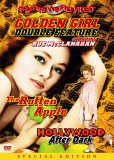| Reviews & Columns |
|
Reviews DVD TV on DVD Blu-ray 4K UHD International DVDs In Theaters Reviews by Studio Video Games Features Collector Series DVDs Easter Egg Database Interviews DVD Talk Radio Feature Articles Columns Anime Talk DVD Savant Horror DVDs The M.O.D. Squad Art House HD Talk Silent DVD
|
DVD Talk Forum |
|
|
| Resources |
|
DVD Price Search Customer Service #'s RCE Info Links |
|
Columns
|
|
|
Hollywood After Dark / The Rotten Apple
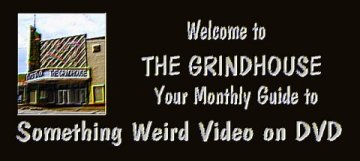
Quick, what's the first name that pops into your head when you think about exploitation queens? Gigi Darlene? Audrey Campbell? Uschi Digard? Pat Barrington? If by some chance you said Rue McClanahan, you've obviously been watching too many Golden Girls reruns. Yet, crazy as it seems, everyone's favorite oversexed sitcom matron actually got her start in the low rent films of the grindhouse circuit. Long before she became a small screen staple in shows like Maude, she was churning out crap like The Grass Eater, Door-to-Door Maniac and How To Succeed with Girls.
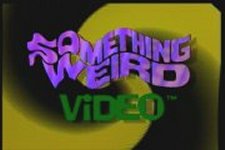 Typically, your notable name didn't get their start is stellar starring roles. In fact, many had to slug away in low budget bunkum for years before anyone discovered their celebrity – and even then, it may have been another couple pictures before bankability was fully established. In the new, post-modern Hollywood of the last three decades, far removed from the studio contract days of "classic" filmmaking, superstars like Kevin Costner and Johnny Depp didn't have to wallow in obscurity for very long. Once they got their Sizzle Beach, USA or Private Resort out of the way, they seemed to soar almost immediately into A-list projects. But back in the day, a performer had limited options outside the controlled setting of the system, and exploitation was often there to offer up its off the books, easy money allure. Besides, there was usually a free trip to a sunny clime during the peak of winter as part of the package.
Typically, your notable name didn't get their start is stellar starring roles. In fact, many had to slug away in low budget bunkum for years before anyone discovered their celebrity – and even then, it may have been another couple pictures before bankability was fully established. In the new, post-modern Hollywood of the last three decades, far removed from the studio contract days of "classic" filmmaking, superstars like Kevin Costner and Johnny Depp didn't have to wallow in obscurity for very long. Once they got their Sizzle Beach, USA or Private Resort out of the way, they seemed to soar almost immediately into A-list projects. But back in the day, a performer had limited options outside the controlled setting of the system, and exploitation was often there to offer up its off the books, easy money allure. Besides, there was usually a free trip to a sunny clime during the peak of winter as part of the package.
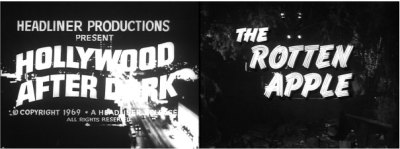
Now, as part of their July release schedule, Something Weird Video has dug deep into their vault of unusual titles to produce two of the films McClanahan made with journeyman John Hayes – 1963's Five Minutes to Love (originally entitled The Rotten Apple) and 1968's Walk the Angry Beach (later called Hollywood After Dark). Talky, trashy and just a little too turgid for most genre fans, both films represent over-processed scripts with nearly incoherent consideration for cinematic basics like narrative and characterization. For anyone hoping (???) for an opportunity to see Blanche Devereaux in the buff, you better hold onto your horsefeathers. The only glimpse of nudity we see associated with Ms. McClanahan is a single shot of breast, and it's an obvious body double taking the flesh-peddling bullet. In fact, if it wasn't for the incredibly seedy situations our primetime heroine finds herself in, you'd be hard pressed to call these excuses for entertainment roadshow ready.
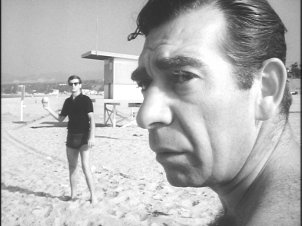 Tony has one of those thankless jobs that only b-movie stars would find acceptable. He works in a dingy junkyard, making little parts out of big ones. He was once an underwater demolitions expert for the military, but now he's a glorified grease monkey. When lowlife hoodlum Nick and his mongoloid mob partner Tommy come waltzing into Tony's scarp emporium, our hero senses a sale. Turns out, Nick has his sights set on robbing an armored car, and needs a scuba savant to seal the steal. Initially rejecting such a criminal career opportunity, Tony decides to take Nick's advice and visit a local burlesque club to "think it over". There, along with the regular clientele of perverts, deviants and businessmen, he can take in the so-called talent. After the seedy strip show, he runs into Sandy Smith, an actress earning her SAG card the amazingly hard way. Apparently Cupid hangs out at this skank shack, because Tony is instantly smitten with this angry, embittered vixen. A few beach dates later, and wedding bells are starting to ring. But Sandy believes in her thespian facilities, and wants to do everything, including meeting a well-meaning writer in his cabana late at night, to land that important role. All she gets is an inebriated groping. Shattered, she becomes even more insular. In the meantime, Tony and his pals pull off the heist and, wouldn't you know it, everyone starts backstabbing each other. If they don't hurry, these two mixed up kids will find nothing but sorrow in and around Hollywood After Dark.
Tony has one of those thankless jobs that only b-movie stars would find acceptable. He works in a dingy junkyard, making little parts out of big ones. He was once an underwater demolitions expert for the military, but now he's a glorified grease monkey. When lowlife hoodlum Nick and his mongoloid mob partner Tommy come waltzing into Tony's scarp emporium, our hero senses a sale. Turns out, Nick has his sights set on robbing an armored car, and needs a scuba savant to seal the steal. Initially rejecting such a criminal career opportunity, Tony decides to take Nick's advice and visit a local burlesque club to "think it over". There, along with the regular clientele of perverts, deviants and businessmen, he can take in the so-called talent. After the seedy strip show, he runs into Sandy Smith, an actress earning her SAG card the amazingly hard way. Apparently Cupid hangs out at this skank shack, because Tony is instantly smitten with this angry, embittered vixen. A few beach dates later, and wedding bells are starting to ring. But Sandy believes in her thespian facilities, and wants to do everything, including meeting a well-meaning writer in his cabana late at night, to land that important role. All she gets is an inebriated groping. Shattered, she becomes even more insular. In the meantime, Tony and his pals pull off the heist and, wouldn't you know it, everyone starts backstabbing each other. If they don't hurry, these two mixed up kids will find nothing but sorrow in and around Hollywood After Dark.
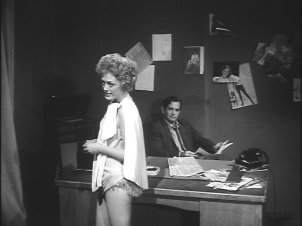 In fact, Hollywood After Dark is just a heist film welded to a melodrama and spiced with a pair of strip scenes to give the debauchery demographic something to sneer over. At the core is a lover's triangle between Rue's Sandy, Jack Vorno's Tony, and clinical depression. Both of our leads have personas baked in hopeless melancholy, and each one expresses it in a decidedly different way. Tony gets liquored up, argues with complete strangers, and sulks like a bratling on a school night. Sandy sashays her fanny, gets molested on the casting couch, and teases her paramour. Together, they're about as much fun as Zelda and F. Scott Fitzgerald at a marriage retreat. But writer/director Hayes is obviously not out for levity and hi-jinxs. He wants to sell this film as a frightening exposé, a chance to see how Tinsel Town tears apart, chews up, and spits out people like Tony and Sandy every single day. Unfortunately, instead of just making a documentary about the local bus depot, he decided to forge ahead with a scattered script full of lame action scenes and half-started heart to hearts. No one ever completes a sentiment in this stagy little snooze-fest. Instead, they hint and suggest, allowing the raw rummy look in their bleary beady eyes to say it all. One viewing, and you too will be heading toward a downward spiral all your own. For our characters, the end appears fatal. For us, it's just aggravating.
In fact, Hollywood After Dark is just a heist film welded to a melodrama and spiced with a pair of strip scenes to give the debauchery demographic something to sneer over. At the core is a lover's triangle between Rue's Sandy, Jack Vorno's Tony, and clinical depression. Both of our leads have personas baked in hopeless melancholy, and each one expresses it in a decidedly different way. Tony gets liquored up, argues with complete strangers, and sulks like a bratling on a school night. Sandy sashays her fanny, gets molested on the casting couch, and teases her paramour. Together, they're about as much fun as Zelda and F. Scott Fitzgerald at a marriage retreat. But writer/director Hayes is obviously not out for levity and hi-jinxs. He wants to sell this film as a frightening exposé, a chance to see how Tinsel Town tears apart, chews up, and spits out people like Tony and Sandy every single day. Unfortunately, instead of just making a documentary about the local bus depot, he decided to forge ahead with a scattered script full of lame action scenes and half-started heart to hearts. No one ever completes a sentiment in this stagy little snooze-fest. Instead, they hint and suggest, allowing the raw rummy look in their bleary beady eyes to say it all. One viewing, and you too will be heading toward a downward spiral all your own. For our characters, the end appears fatal. For us, it's just aggravating.
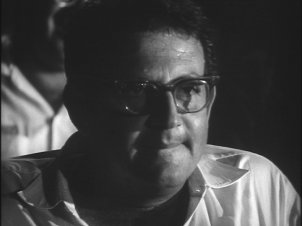 All of which makes the middle act bump and grind that much more miserable. Featuring McClanahan in full Elvis mode (meaning filmed only from the neck down) and a bevy of beastly beauties, these nauseating narrative lapses argue for the literal definition of exploitation. There is no real reason to see chunky, chaffed babes belittling themselves for mob after mob of sweaty, shifting Teamsters, yet Hayes can't help himself. As one grubby gal after another drops her costume and exposes her pasties, we get quick insert shots of sweaty foreheads and gratuitous grins. While these moments offer proof positive that, when it comes to nudity, men think with their members almost exclusively, they barely fortify the ongoing crime story. In fact, they tend to undermine the entire movie. Hayes obviously hoped that by highlighting this skid row skin show, he would point out the desperation and debasement that many wannabe "actresses" go through just to make ends meet. It's also the rotten rationale behind the meeting Sandy has with a grab-ass rapist writer. Instead of commenting on our heroine's grand gullibility (sure, EVERYONE in Hollywood discusses scripts at midnight in a private bungalow), the filmmaker wants us to believe that Tinsel Town treats its possible protégés like trash. Back in the day, such a clear cliché may have seemed novel. But here it just makes Hollywood After Dark's crime and personal punishment feel like an awkward afterthought.
All of which makes the middle act bump and grind that much more miserable. Featuring McClanahan in full Elvis mode (meaning filmed only from the neck down) and a bevy of beastly beauties, these nauseating narrative lapses argue for the literal definition of exploitation. There is no real reason to see chunky, chaffed babes belittling themselves for mob after mob of sweaty, shifting Teamsters, yet Hayes can't help himself. As one grubby gal after another drops her costume and exposes her pasties, we get quick insert shots of sweaty foreheads and gratuitous grins. While these moments offer proof positive that, when it comes to nudity, men think with their members almost exclusively, they barely fortify the ongoing crime story. In fact, they tend to undermine the entire movie. Hayes obviously hoped that by highlighting this skid row skin show, he would point out the desperation and debasement that many wannabe "actresses" go through just to make ends meet. It's also the rotten rationale behind the meeting Sandy has with a grab-ass rapist writer. Instead of commenting on our heroine's grand gullibility (sure, EVERYONE in Hollywood discusses scripts at midnight in a private bungalow), the filmmaker wants us to believe that Tinsel Town treats its possible protégés like trash. Back in the day, such a clear cliché may have seemed novel. But here it just makes Hollywood After Dark's crime and personal punishment feel like an awkward afterthought.
 And things just get more depressing from here. You see, over at Harry's horror show trash heap, young husband Ben is looking for a starter. What he finds is Satan's version of Fred Sanford, a couple of tired hired goons, and a resident prostitute to service everyone's personal crankcase needs. Initially toying with his customer (Ben is on his way to San Diego – he's got a job lined up there) Harry final sends him over to that slattern Sally "Poochie", who instantly desires to measure his dipstick. Flattered, Ben then remembers his whiny wife Edna and their infant daughter baking in the roadside sun, and tries again to get the part. This time, Harry tells the local law enforcement that this out of towner is really a local fence, selling our junkman incredibly hot parts out of obviously stolen cars. With this information in hand, the cops beat the snot out of Ben. What they want is a confession. What they end up with is a lot of police brutality egg on their faces. After putting the muscle on Harry again, our trash titan gives up one of his landfill losers, a dimwitted thug named Blowhard. Good thing too, as this pumped up peon was just about to rape Ben's bride. After a brief family reunion, our hero decides to teach Harry a lesson once and for all. He heads back to the scarp heap, locates the brazen bully, and cracks his camshafts one by one. Ben then tries to save Sally from her cooter for cash lifestyle. But she insists on staying with her black and blue beau. After all, once a Rotten Apple, always a rotten apple.
And things just get more depressing from here. You see, over at Harry's horror show trash heap, young husband Ben is looking for a starter. What he finds is Satan's version of Fred Sanford, a couple of tired hired goons, and a resident prostitute to service everyone's personal crankcase needs. Initially toying with his customer (Ben is on his way to San Diego – he's got a job lined up there) Harry final sends him over to that slattern Sally "Poochie", who instantly desires to measure his dipstick. Flattered, Ben then remembers his whiny wife Edna and their infant daughter baking in the roadside sun, and tries again to get the part. This time, Harry tells the local law enforcement that this out of towner is really a local fence, selling our junkman incredibly hot parts out of obviously stolen cars. With this information in hand, the cops beat the snot out of Ben. What they want is a confession. What they end up with is a lot of police brutality egg on their faces. After putting the muscle on Harry again, our trash titan gives up one of his landfill losers, a dimwitted thug named Blowhard. Good thing too, as this pumped up peon was just about to rape Ben's bride. After a brief family reunion, our hero decides to teach Harry a lesson once and for all. He heads back to the scarp heap, locates the brazen bully, and cracks his camshafts one by one. Ben then tries to save Sally from her cooter for cash lifestyle. But she insists on staying with her black and blue beau. After all, once a Rotten Apple, always a rotten apple.
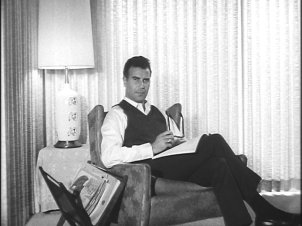 Truth be told, the amount of irritating ennui we experience in Hollywood After Dark is nothing compared to the bilious bombast exploding out of The Rotten Apple. The film begins with a warning by actor (and co-writer) Paul Leder. Yet instead of cautioning us on how god-awfully exasperating this film is, he instead advises us to be on our guard. Every town apparently has someone like the lugubrious loudmouth junkman Harry living in their midst. Why McCarthy focused on the ideologically inert Commie, and not on this far more meaningful menace is a complete and utter mystery. Anyway, with the intro out of the way, we go in expecting a ripe bit of bodice tearing, with that randy rascal Rue selling her skivvies to customers while hired hand Blowhard gets a free show in the process. What we wind up with, however, is a massively theatrical mess that feels like it was penned by Tennessee Ernie Williams. Harry has more lines than everyone else in the film combined, and delivers them at decibels so voluminous that the People's Republic of China are screaming for him to shut the Hell up. Instead of obeying their request, he simple blathers on an on, using any and all opportunities to wax faux philosophical about life, the universe and auto theft. The peculiar plot about a young husband getting shanghaied by these motor parts morons is completely ancillary. So is Ms. McClanahan's sugar shack. Nope, this is Harry's film to carry or cripple. Amazingly, he manages to do both, and neither.
Truth be told, the amount of irritating ennui we experience in Hollywood After Dark is nothing compared to the bilious bombast exploding out of The Rotten Apple. The film begins with a warning by actor (and co-writer) Paul Leder. Yet instead of cautioning us on how god-awfully exasperating this film is, he instead advises us to be on our guard. Every town apparently has someone like the lugubrious loudmouth junkman Harry living in their midst. Why McCarthy focused on the ideologically inert Commie, and not on this far more meaningful menace is a complete and utter mystery. Anyway, with the intro out of the way, we go in expecting a ripe bit of bodice tearing, with that randy rascal Rue selling her skivvies to customers while hired hand Blowhard gets a free show in the process. What we wind up with, however, is a massively theatrical mess that feels like it was penned by Tennessee Ernie Williams. Harry has more lines than everyone else in the film combined, and delivers them at decibels so voluminous that the People's Republic of China are screaming for him to shut the Hell up. Instead of obeying their request, he simple blathers on an on, using any and all opportunities to wax faux philosophical about life, the universe and auto theft. The peculiar plot about a young husband getting shanghaied by these motor parts morons is completely ancillary. So is Ms. McClanahan's sugar shack. Nope, this is Harry's film to carry or cripple. Amazingly, he manages to do both, and neither.
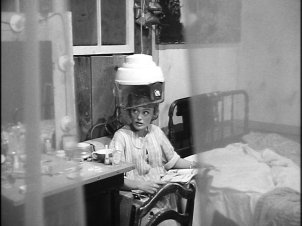 Aside from the numerous screeching speeches, the biggest problem in The Rotten Apple is its basic implausibility. The minute we understand the cops and robbers dynamic at play, once we realize that NO ONE functions under the auspices of the law (not even the police), we find ourselves lost in the lawlessness. Our completely crooked cops aside, Harry seems to be a megalomaniacal master of his own dreary domain, capable of calling all the shots without ever once being questioned. He can frame people at will, kill them with equal ease, and get his gal to turn a few tricks without ever once having to raise his fist. Certainly, this makes him a hissable villain, the kind of scoundrel we want kicked to the curb…and then all the way down the street and out of town. But Hayes wants to amplify Harry's horribleness. Unfortunately, this director doesn't believe in actions speaking louder than words. He lets Leder ramble on and on, delivering his denoucements like a longshoreman reciting Shakespeare. Whatever wicked wantonness the film hints at is therefore washed away in wave after wave of high-pitched histrionics. Hardly worth the effort to experience, this is one Rotten Apple that definitely destroys the whole bunch.
Aside from the numerous screeching speeches, the biggest problem in The Rotten Apple is its basic implausibility. The minute we understand the cops and robbers dynamic at play, once we realize that NO ONE functions under the auspices of the law (not even the police), we find ourselves lost in the lawlessness. Our completely crooked cops aside, Harry seems to be a megalomaniacal master of his own dreary domain, capable of calling all the shots without ever once being questioned. He can frame people at will, kill them with equal ease, and get his gal to turn a few tricks without ever once having to raise his fist. Certainly, this makes him a hissable villain, the kind of scoundrel we want kicked to the curb…and then all the way down the street and out of town. But Hayes wants to amplify Harry's horribleness. Unfortunately, this director doesn't believe in actions speaking louder than words. He lets Leder ramble on and on, delivering his denoucements like a longshoreman reciting Shakespeare. Whatever wicked wantonness the film hints at is therefore washed away in wave after wave of high-pitched histrionics. Hardly worth the effort to experience, this is one Rotten Apple that definitely destroys the whole bunch.
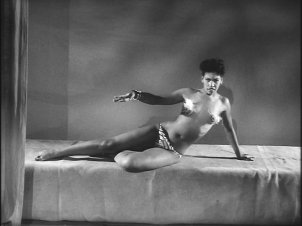 Always at the fore of delivering the best transfers that the stock elements will allow, Something Weird's treatment of these titles is relatively decent. Both are crisp black and white entries, each one presenting its masterful monochrome in 1.33:1 full frame images. Apple looks a little better, if only because the cinematography does a better job of taking in the atmospheric aspects of the junkyard. Hollywood has its moments, but is frequently washed out and flat. Sonically, the Dolby Digital Mono is purposefully passable. There is not much that can be done with such technologically inferior aural elements. As for extras, we are once again treated to a collection of crazy genre trailers for films with fascinating titles like Scandal Incorporated, Female Jungle and the classic A Sweet Sickness. There are also four archival short subjects. In essence nothing more than nudie loops, we get the chance to watch the candidates for the Model School, the Screen Test of Dorothy Van Nuys, a selection of naughty Reel Facts and a fairly obvious Hollywood Peep Show. Add in a gallery focusing exclusively on The Rotten Apple and you've got the standard SWV wealth of goodies.
Always at the fore of delivering the best transfers that the stock elements will allow, Something Weird's treatment of these titles is relatively decent. Both are crisp black and white entries, each one presenting its masterful monochrome in 1.33:1 full frame images. Apple looks a little better, if only because the cinematography does a better job of taking in the atmospheric aspects of the junkyard. Hollywood has its moments, but is frequently washed out and flat. Sonically, the Dolby Digital Mono is purposefully passable. There is not much that can be done with such technologically inferior aural elements. As for extras, we are once again treated to a collection of crazy genre trailers for films with fascinating titles like Scandal Incorporated, Female Jungle and the classic A Sweet Sickness. There are also four archival short subjects. In essence nothing more than nudie loops, we get the chance to watch the candidates for the Model School, the Screen Test of Dorothy Van Nuys, a selection of naughty Reel Facts and a fairly obvious Hollywood Peep Show. Add in a gallery focusing exclusively on The Rotten Apple and you've got the standard SWV wealth of goodies.
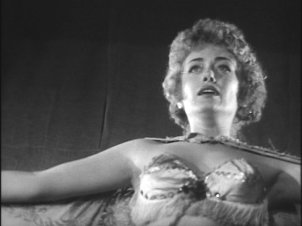 If only the films they accompany weren't so mother trucking infuriating. Both Hollywood After Dark and The Rotten Apple make your typical roughie look routine, and argue for the simple pleasures of a snuff film. They argue for exploitations limits both as an entertainment and as a statement of purpose, and reduce the raincoat crowd to nothing more than witnesses for the persecution. And besides, our leading lady never once doffs her unmentionables to show off her stretch marks. If you can survive these pompous, pretentious presentations, you're a bigger Rue McClanahan fan than anyone has the right to be. She, and the movies she's supporting, are more olden than Golden.
If only the films they accompany weren't so mother trucking infuriating. Both Hollywood After Dark and The Rotten Apple make your typical roughie look routine, and argue for the simple pleasures of a snuff film. They argue for exploitations limits both as an entertainment and as a statement of purpose, and reduce the raincoat crowd to nothing more than witnesses for the persecution. And besides, our leading lady never once doffs her unmentionables to show off her stretch marks. If you can survive these pompous, pretentious presentations, you're a bigger Rue McClanahan fan than anyone has the right to be. She, and the movies she's supporting, are more olden than Golden.
Want more Gibron Goodness? Come to Bill's TINSEL TORN REBORN Blog (Updated Frequently) and Enjoy! Click Here
|
| Popular Reviews |
| Sponsored Links |
|
|
| Sponsored Links |
|
|
| Release List | Reviews | Shop | Newsletter | Forum | DVD Giveaways | Blu-Ray | Advertise |
|
Copyright 2024 DVDTalk.com All Rights Reserved. Legal Info, Privacy Policy, Terms of Use,
Manage Preferences,
Your Privacy Choices | |||||||









